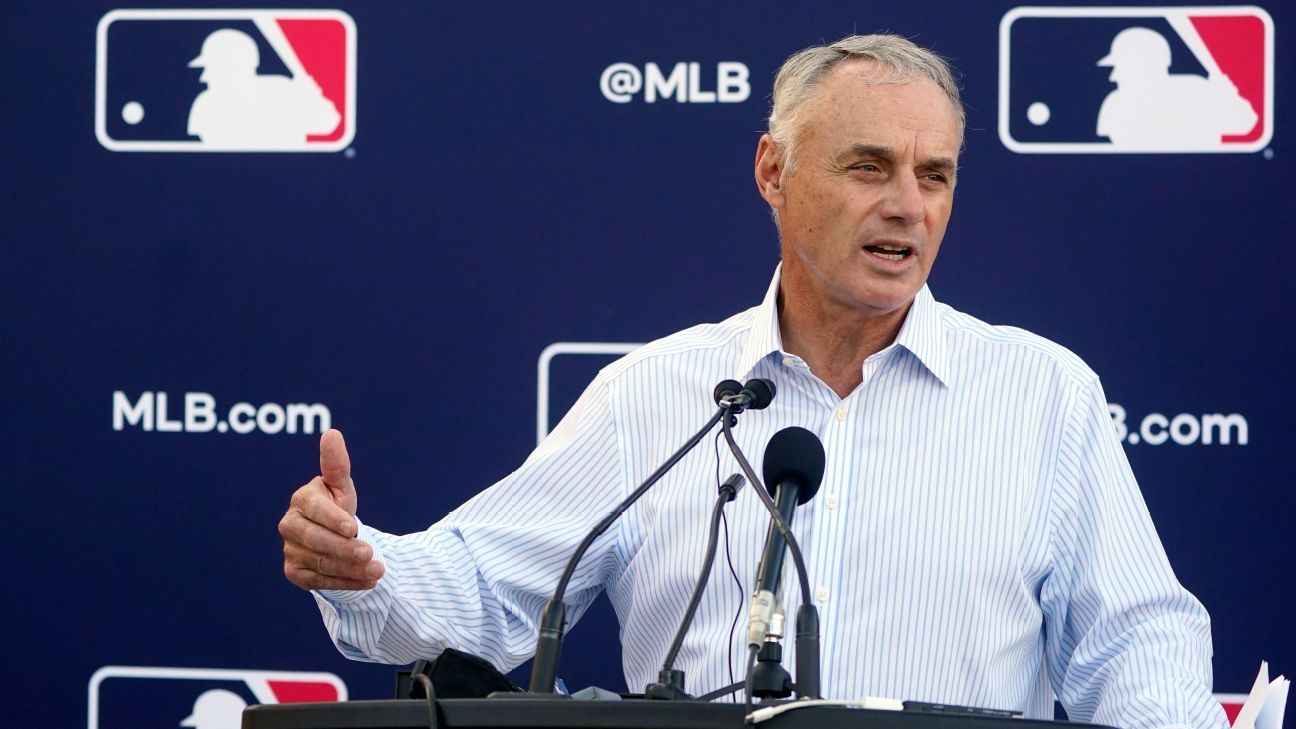With the contentious 99-day lockout behind it and a full 162-game schedule kicking off with Opening Day on Thursday, Major League Baseball commissioner Rob Manfred stressed that players and owners must now work together to “deliver the most entertaining product for our fans” while noting the possibility of upcoming rule changes, including a pitch clock.
Implementing the pitch clock to help the pace of play remains a high priority and was a topic of discussion as Manfred met with players during spring training.
“I don’t want to prejudge the process as far as handicapping it. I will say this: We’ve experimented extensively with the pitch clock in the minor leagues. It does help in terms of the pace of the game. It does help also in terms of the way the game is played, meaning more action, so it is something that remains high on the priority list of ownership,” Manfred said in an interview on ESPN’s SportsCenter. “We have a great game, but historically I think the game was a little crisper the way it moved along, it had a little more action in it, more frequent balls in play, and getting back to that form of baseball would be an improvement for us, for the players and for the fans.”
Manfred said he wants to make sure “we get complete input from the players on rules changes.”
The new collective bargaining agreement includes a committee that will decide on those rule changes — a group made up by four active players, six members appointed by MLB and one umpire. Previously, the league had the authority to unilaterally introduce rule changes as long as it gave the union one-year notice.
Among the potential changes for the future: the pitch clock, larger bases and rules limiting infield shifts.
The average nine-inning game in 2021 lasted a record 3 hours, 10 minutes — up three minutes from 2020, 15 minutes from 2011 and 31 minutes from 1984, the last season that average lasted less than 2 hours, 40 minutes. Studies have shown that additional time between pitches is the primary factor in the increased length of games.
Pitch clocks have been used in the minor leagues for several years. Starting in June 2021, baseball experimented with a 15-second clock in the low-Class A West League with nobody on base and 17 seconds with runners on. Prior to the 15-second clock, the average game in the West League lasted 3 hours, 2 minutes; after the clock, it lasted 2 hours, 41 minutes.
In 2022, Triple-A will use a 14-second clock with no runners on base and 19 seconds with runners on.
Manfred said he believes the new PitchCom device approved for 2022 will also help speed up the game. Using a pad with buttons on the wrist of his gloved hand, the catcher can signal the type of pitch and location to the pitcher through a listening device.
The technology is an anti-sign-stealing device, but “it also has a pace-of-game effect,” Manfred said. “We think PitchCom is going to improve our product on the field this year.”
Manfred also said that he expects legalized gambling on baseball to continue its growth.
“We see it primarily as a form of increasing fan engagement. It’s an additional way for our fans to interact with the game,” he said. “I do think in-game betting is going to be a significant component. I think if you talk to people who are expert in the field that they don’t see outcome betting as a major growth area. It is in fact in-game betting, so-called prop betting, that is going to be the growth area. And most of that betting is going to take place on mobile devices.”
Due to the lockout, the season is starting a week later than the originally scheduled March 31 Opening Day. Manfred said Thursday starts a “season-long effort to kind of make up to our fans for the difficult winter they endured.”
“The most important thing is always to make sure we have the game on the field for our fans,” Manfred said. “I did feel pressure to try to make sure that we not only had a season, but that we had a 162-game season, particularly in light of the difficult years we had in 2020 and 2021.”
